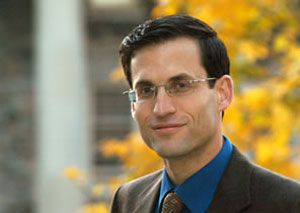 |
| Rob Rutledge poses the question: "How can you heal when you're scared?" |
How do people cope when they’ve been shattered by a cancer diagnosis? That’s the question radiation oncologist Rob Rutledge has been pursuing his entire medical career.
An associate professor in the Faculty of Medicine, Dr. Rutledge began searching for a better way to treat patients when he was a medical student. The scientific-based methods he was being taught were leading edge, but “just didn’t feel quite right,” he says.
One day he was browsing in the library and a book stood out: Love, Medicine and Miracles by Dr. Bernie Siegal, a cancer surgeon. Dr. Siegal is a pioneer in the cancer support group movement and his book tackles the human side of the cancer experience.
“When I had that book in my hand and I was reading it,” says Dr. Rutledge, “I just knew. There was no doubt. This was my path.”
But it would take Dr. Rutledge some time to journey down that path of the human side of a cancer diagnosis. As a practising oncologist, he spent time taking care of people and trying to really listen to them. He provided clear information and treatment plans and he started to facilitate a weekly cancer support group with a social worker.
But it didn’t all come together until a dozen years ago when he saw a poster for a stress reduction workshop by psychotherapist and spiritual teacher Timothy Walker. Dr. Rutledge set up an appointment with Dr. Walker. That was the beginning of both a wonderful friendship and a partnership that has led to a program of life skills training and weekend retreats for cancer patients and their families, Skills for Healing.
The weekend retreats take the best of scientific medical care and join it to stress reduction methods, such as meditation, to transform the experience of cancer into what the two call a journey of psychological and spiritual growth.
“How can you heal when you are scared?” asks Dr. Rutledge.
“When you’re facing financial, physical, relationship and other changes?
“How can you find healing even if things are not going well with the physical self? How can you be broken yet whole?”
Those are the difficult questions that Drs. Rutledge and Walker help patients come to grips with and get beyond. The weekend retreats teach cancer patients and their families to deal head on with emotional issues, including fear and anger. And they’ve been so successful that the retreats have now spawned a book and a video.
Drs. Rutledge and Walker have also co-founded The Healing and Cancer Foundation. A registered charity, the foundation provides talks, retreats, and virtual presentations, lectures, the video and the new book, as well as other materials.
 |
The book, The Healing Circle: Integrating science, wisdom and compassion in reclaiming wholeness on the cancer journey was launched at Dalhousie in May and is sold through the foundation.
The powerful video follows the lives of five people who’ve been diagnosed with cancer and attend one of the weekend retreats. It follows the participants through their struggle after a cancer diagnosis, the weekend retreat and interviews after they’ve experienced the program.
Both the video and the book are designed to offer a practical approach to a cancer diagnosis, but they provide more than that in the inspiring true stories of those who are learning to deal with the possibility of death and striving to find the meaning in life.
As Dr. Rutledge points out, we don’t talk about death or the spirit much in our science-based world, but at one time we didn’t talk about exercise or psychology as treatment methods either.
We are now recognizing the role nutrition and exercise play in keeping our bodies healthy and helping them heal. And we are beginning to deal with the psychological aspects of disease and healing.
“It will probably take some more time though,” says Dr. Rutledge, “before we really recognize the spiritual aspect. But the spirit is what is there when everything else is stripped away.”
Drs. Rutledge and Walker are out in front of the treatment curve and by teaching people to embrace the whole human experience, they help cancer patients learn to face whatever comes with the diagnosis. Now they want to take the success of their program internationally.
They are also seeking opportunities to create documentary materials for different types of cancer (colon, thyroid and rare cancers).
They also want to work with people affected by cancer in other communities, such as First Nations, and with people of different religious, cultural, and sexual backgrounds. They hope to create a wide range of educational materials that would be offered free, and which could help those newly diagnosed from those communities.
“The big picture is we want to give this away to as many people as possible,” says Dr. Rutledge.
“We want to create a program that really helps people with a cancer diagnosis – and not just a cancer diagnosis – it can help everyone.”
